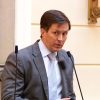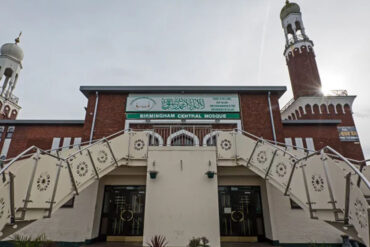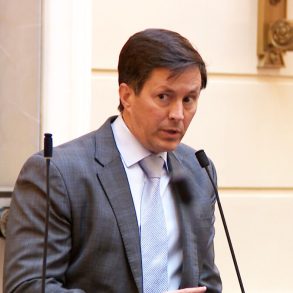Speaking before the United Nations General Assembly, President Donald Trump stunned world leaders by declaring that London “wants to go to sharia law.” He linked the claim to Europe’s migration crisis, warning that the continent is being “invaded by a force of illegal aliens like nobody’s ever seen before.” Trump said leaders were paralyzed by political correctness, adding, “It’s not sustainable… they’re doing absolutely nothing about it.” Turning to Britain’s capital, he declared, “I look at London where you have a terrible mayor, a terrible, terrible mayor. And it’s been so changed, so changed. Now they want to go to sharia law, but you are in a different country. You can’t do that.”
The remark drew immediate backlash from London’s mayor, Sadiq Khan, who fired back that Trump was “racist, sexist, misogynistic, and Islamophobic.” Khan told the BBC, “People are wondering what it is about this Muslim mayor who leads a liberal, multicultural, progressive and successful city, that means I appear to be living rent-free inside Donald Trump’s head.” Yet Trump’s comments resonated because they tapped into real controversies inside Britain about religious councils, unequal treatment of women, and failures to uphold one law for all.
Sharia Councils in Britain
Although UK officials insist that English law remains supreme, sharia councils have quietly grown since the first one was set up in Leyton in 1982. By 2017, a government review estimated around 85 across the country, many in London, Birmingham, and northern towns. These councils primarily handle religious divorce, inheritance, and family disputes. They are not legally binding under British law. But in practice, many Muslims turn to them first, giving these panels social authority that often eclipses civil courts.
The problem, critics say, is discrimination. A government-commissioned review by Professor Mona Siddiqui found that over 90 percent of users were women seeking religious divorce. Many had no civil marriage, leaving them legally unprotected. Sharia judges, almost always male, have pressured women to reconcile with abusive husbands, demanded payment to secure a divorce, or left women trapped in limbo. As Baroness Cox, who has campaigned against these councils, warned in Parliament, they amount to a “rapidly developing alternative quasi-legal system” that undermines equality.
A Parallel System Creeping In
The sinister side of these councils lies in their practical effect. Nick Timothy, a Conservative MP and former adviser to Theresa May, argued that sharia marriages should be criminalized if they lack civil registration. He warned that otherwise Britain would tolerate “privatized justice” that leaves women with no rights. Julie Bindel, a journalist who has investigated the councils, called it a “dangerous rise” that fuels honor crimes, forced marriages, and female genital mutilation. She revealed shocking figures: more than 2,700 “honor-based” offences recorded in a single year, including 201 cases of forced marriage and 111 involving FGM. Yet prosecutions remain rare.
Even government statements have grown troubling. In September, a minister told Parliament that sharia councils are “in line with British values” because they are voluntary, just like Christian or Jewish religious tribunals. Critics saw that as an astonishing attempt to normalize discrimination. Tim Dieppe of Christian Concern blasted the claim, insisting that sharia is “fundamentally incompatible with English law and British values.” He pointed out that unlike Jewish Beth Din or ecclesiastical courts, sharia tribunals create an entire shadow system that is binding within communities and erodes equal treatment.
The Worst Aspects from a Free American Perspective
Trump’s words strike deep because the principles at stake directly contradict core American freedoms. Sharia law, in strict form, diminishes women’s rights, allows polygamy, and permits forced marriage. In matters of divorce, men can dissolve a marriage with three words, while women must beg judges for release. Non-Muslims face restrictions, second-class treatment, and obstacles to religious practice. Free expression is curbed by blasphemy taboos, and lifestyle choices—from alcohol to relationships—can carry harsh penalties in countries where sharia dominates. To Americans, these are not just differences but violations of liberty, equality, and human dignity.
A Clash of Freedoms
The Khan-Trump feud has long been personal, with Trump calling the mayor a “stone cold loser” in the past. Yet this clash is larger than personality. When Trump says London is sliding toward sharia, he is accusing Britain of surrendering its most fundamental principle: one law for all. Khan and his allies insist that London remains safe, diverse, and open. Labour MPs like Wes Streeting argue that Khan is “a mayor who marches with Pride” and is not imposing religious law. Rupa Huq dismissed Trump’s words as “blatant barefaced lies.” But the existence of dozens of sharia councils, unregistered marriages, and discriminatory rulings tells a darker story.
A Sinister Penetration of British Society
This is not a matter of criminal law being replaced overnight. It is the gradual normalization of a parallel system, tolerated by politicians afraid of offending religious sensitivities. It is women being told their rights are secondary, children left unprotected, and speech curtailed under the guise of public order. Trump’s rhetoric is crude, but the reality is that Britain has allowed sharia to carve out its own space, unchecked and expanding. The danger is not that London is officially governed by sharia, but that freedom itself is being chipped away piece by piece, until it is no longer recognizable. In that sense, Trump’s warning may be more accurate than his critics want to admit.
NP Editor: Some of this is happening in the U.S. as well. It needs to be stopped.







